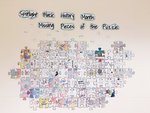



PITTSBORO — School Counselor Orlando Dobbin Jr. has long worked to honor different cultures by creating videos with his students at Pittsboro Elementary to celebrate commemorative months such as National Hispanic, Asian American and Pacific Islander and Irish-American Heritage months.
Celebrating Black History Month this February, then, wasn’t much different.
“Each month, I really tried to make it a point of emphasis to create space for the stories of the people from that culture to share a little bit about who they are and what their culture is all about,” Dobbin said. “I wanted to think about what are meaningful ways in which I can not only give people an opportunity to be exposed to African Americans who have made a big difference in our community, our world ... but also, how can I scale it down so that they can see a representation of the Black people that are in their immediate school community?”
Last February, Dobbin, who is Black, asked Black students what they loved about being Black. Several students said they loved their curly hair.
“For me personally, it was super powerful to hear that because I remember feeling shame about my hair and how it looked,” he said. “It was really beautiful to see the ways in which they had embraced their hair and the way they look.”
This year, making videos took a bit more planning, Dobbin said; he had to coordinate Zoom calls rather than just calling students out of their classrooms. He also had to coordinate with the families of students, as he followed the 2021 “Family” theme of Black History Month, set by the Association for the Study of African American Life and History (ASALH), the founders of the month. He even got to interview his family for a video, too.
“It’s really cool to see these kids with their dad, their siblings to talk about what they like about being Black and what their favorite memories are as a family and what they love most about their family,” he said.
Across Chatham, many educators like Dobbin are finding creative ways to celebrate and teach Black History Month this year, even with the challenges presented by remote and hybrid learning. Horton Middle School will celebrate its fifth celebration of George Moses Horton Day on Friday at the school. There have been choral studies of music by Black composers, timelines and bulletins in the hallway and classroom activities honoring Black heroes and figures.
In Chatham County Schools, the district’s equity team — which has representatives from every school — put together a Google document with a variety of resources for faculty to celebrate the month.
“The following resources have been collected to help support CCS teachers in celebrating and teaching Black History,” that document says. “First and foremost, Black history is U.S. history! We believe Black history should be taught throughout the year, however February is a time to dig deeper and celebrate the rich history and significant contributions.”
Amanda Hartness, CCS Assistant Supt. of Academic Services and Instructional Support, said the month provides an opportunity for some of the district’s most marginalized students to be explicitly celebrated. She added that the resources compiled by the equity team serve as a good way to offer a more united approach to teaching the month.
“If I just provide those resources, I’m just Amanda Hartness, one white female with an elementary perspective, for the most part, right?” she said. “The beauty of that team is it’s made up of a variety of stakeholders from across the district and from different levels, different job roles, as well as different nationalities, races. So by having that group be the one that develops materials, it makes it more applicable to folks.”
At Woods Charter School, teachers have celebrated the month with virtual readings, art galleries and videos. The school is still learning remotely, so they’ve gotten creative to engage students.
“We’re just trying to make sure that as a faculty,” said faculty representative Rachel Lawrence at WCS’ last school board meeting, “we’re attending to these important events and observances and keeping our collective consciousness on them even though there’s so many distractions right now.”
Black History Month this year follows debate among the State Board of Education in January regarding revisions to K-12 social studies standards and whether the U.S. is racist. The board ultimately voted 7-5 on Feb. 4 to approve the proposed changes of the standards at its meeting on Thursday, which included new State Superintendent Catherine Truitt’s amended language — removing “systemic racism,” “gender identity,” and “systemic discrimination” from the standards and replacing the words with racism, discrimination and identity.
Amy King, a history teacher at Chatham Central High School, said teaching Black History Month exemplifies the importance of teaching positive history along with “hard history.”
“I think teaching hard history is so important. And I think certainly the lessons that we have had recently, from certain current events, as of late, teach us the importance of why all students need to know truth, and history,” she said. “So much of that history we could focus on is really dismal and tumultuous, and really horrible. And so it’s nice to bring out things to students and have them research and look into things that they maybe have not been taught before and are positive stories. So I do try to do both.”
This year, King planned activities around the “Following Harriet” podcast, teaching students about Harriet Tubman’s life beyond her involvement in the Underground Railroad — as a wife and mother, an entrepreneur, a soldier, a spy, a nurse and an activist who fought for women’s right to vote.
Last February, she taught about lynching, partnering with the Chatham Community NAACP Branch to talk about Chatham’s six lynching victims and about reconciliation and justice. She was prepared for pushback, but said none came. She thanked her school for supporting her in taking risks in the classroom to teach students true history.
“I just made it really clear to my students from day one, that this was not a blame or shame,” King said. “This was about learning, and it was about bringing some peace or reconciliation to our community, because we each represent a different member of that community. And I want to tell you, it was phenomenal.”
King said she thought that her lessons would validate some of the feelings and experiences of her Black students.
“But actually, what happened was they already knew a lot of these stories, and that’s the part I had underestimated as their white female teacher,” she said. “They already knew a lot of these stories, maybe not the finer details, but they knew they had heard it and passed down through their families — it was actually the white students who were just like, ‘What!’”
Judit Zimo, an ESL teacher at Chatham Middle School, has also noticed a lack of background knowledge among her students when it comes to prominent Black leaders. So this year, she decided to make a large hall display showcasing figures who remained unknown to many middle schoolers — Alice Coachman, Garret Morgan, Benjamin Banneker, Doris Miller, Shirley Chisholm and Henrietta Lacks.
She said it was important for students to know history that was “hidden for a long time,” like the Cicero Race Riot of 1951 or the 1921 Tulsa Race Massacre.
“A lot of students don’t know about this,” Zimo said, “and it is so important that we all go back and read and learn from the systemic racism that happened and happens now.”
Some critics of Black History Month, or those teaching and talking about race generally, have said students are too young to understand such topics.
Dobbin disagrees; he thinks creating space for more history and stories to be told makes us more human, and in turn, can help students “lean into being their most confident selves.”
“Elementary school students, obviously developmentally, they’re at an age where they might not be able to comprehend all of it,” he said. “But I think this is the best time to start teaching them the importance of celebrating who they are, celebrating the cultures and identities of other people. I think it’s important, really important, especially at this age to start to create the atmosphere for which they can learn to celebrate both themselves and others so that we can create a world where people are cool humans.”
Reporter Hannah McClellan can be reached at hannah@chathamnr.com or on Twitter at @HannerMcClellan.